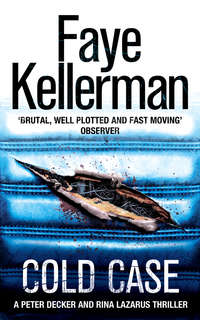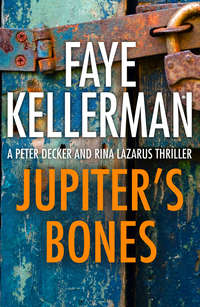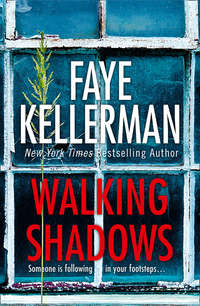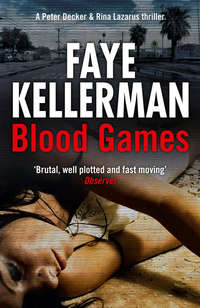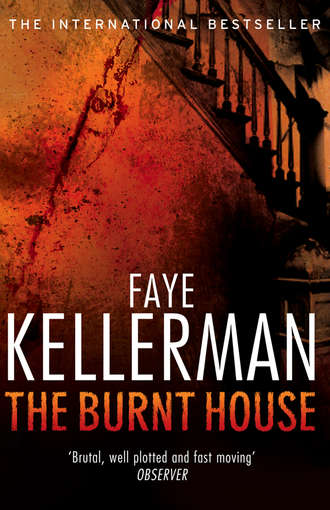
Полная версия
The Burnt House

THE BURNT HOUSE

FAYE KELLERMAN


Copyright
HarperCollinsPublishers Ltd. 1 London Bridge Street London SE1 9GF
www.harpercollins.co.uk
Published by HarperCollinsPublishers 2007
Faye Kellerman asserts the moral right to be identified as the author of this work
A catalogue record for this book is available from the British Library
All rights reserved under International and Pan-American Copyright Conventions. By payment of the required fees, you have been granted the non-exclusive, non-transferable right to access and read the text of this ebook on-screen. No part of this text may be reproduced, transmitted, down-loaded, decompiled, reverse engineered, or stored in or introduced into any information storage and retrieval system, in any form or by any means, whether electronic or mechanical, now known or hereinafter invented, without the express written permission of HarperCollins ebooks
HarperCollinsPublishers has made every reasonable effort to ensure that any picture content or written content in this ebook has been included or removed in accordance with the contractual and technological constraints in operation at the time of publication
Source ISBN: 9780007243204
Ebook edition: September 2008 ISBN: 9780007283583
Version: 2017-10-24
To Jonathan, my on-the-spot editor and shrink
And a very special thanks to Bill Kurtis for all his help
Contents
Title Page Copyright Dedication The Burnt House Prologue Chapter One Chapter Two Chapter Three Chapter Four Chapter Five Chapter Six Chapter Seven Chapter Eight Chapter Nine Chapter Ten Chapter Eleven Chapter Twelve Chapter Thirteen Chapter Fourteen Chapter Fifteen Chapter Sixteen Chapter Seventeen Chapter Eighteen Chapter Nineteen Chapter Twenty Chapter Twenty One Chapter Twenty Two Chapter Twenty Three Chapter Twenty Four Chapter Twenty Five Chapter Twenty Six Chapter Twenty Seven Chapter Twenty Eight Chapter Twenty Nine Chapter Thirty Chapter Thirty One Chapter Thirty Two Chapter Thirty Three Chapter Thirty Four Chapter Thirty Five Chapter Thirty Six Chapter Thirty Seven Chapter Thirty Eight Chapter Thirty Nine Chapter Forty Chapter Forty One Chapter Forty Two Chapter Forty Three Chapter Forty Four Chapter Forty Five Chapter Forty Six Keep Reading About the Author Also By Faye Kellerman About the Publisher
PROLOGUE
AT EIGHT-FIFTEEN IN the morning on a balmy Los Angeles winter’s day, a 282 Lucent Industry Aircraft, better known as WestAir flight 1324, took off from Burbank Airport holding forty-seven commuters. The ETA to its final destination, San Jose, California, was one hour and six minutes and the ride was expected to be smooth and uneventful. The skies were blue, the wind gentle, and the heavens’ visibility was unobstructed in all directions. Sixty-seven seconds later, with its nose still headed skyward, it inexplicably yawed to the left, did a 360 rotation on its axis, and began to plunge down until it clipped a power line, thundered its last hurrah, and burst into flames, the explosion so great that it was heard five miles away.
The main bulk of the fiery fuselage landed on a three-story apartment house in the Granada Hills section of the West Valley, transferring its inferno to the residential structure. Windows shattered, gas pipes detonated, and electrical wires arced blue lightning through the skies. The eighteen-unit building crafted from stucco and wood was swallowed by flames that spanned every color of the rainbow. The noise was so deafening that it drowned out the human screams. The stench of fire, smoke, and fuel oil that infused the air was toxic and suffocating. Oxygen was choked out of the atmosphere. Flesh burned alongside metal and leather. Debris were scattered and windblown for hundreds of feet. Within a heartbeat of time, a green suburban landscape had been transformed into an unimaginable holocaust of hell.
1

THE CEREAL SPOON stopped midair. Rina turned to her husband. “What was that?”
“I don’t know.” The lights flickered and died along with the TV, the refrigerator, and probably everything in the house electrical. Decker reached over and picked up the portable phone. He punched in one of the landlines but got no response.
Rina lowered the spoon into the cereal bowl. “Dead?”
“Yep.” Decker flicked the light switch on and off, a futile gesture of hope. It was eight in the morning and the kitchen was bathed in eastern light that didn’t require electrical augmentation. “Something blew. Probably a major transformer.” He frowned. “That shouldn’t affect the phone lines, though.” He pulled out his cell and tried to contact someone on a landline at work. With no response coming from the other end, Decker knew that the damage was widespread.
The Los Angeles Police Department’s West Valley substation—Devonshire Division in another age—was a few miles away from where Decker lived. When this kind of thing happened, the place was a madhouse, a switchboard of panicked people with emergency lines ringing off the hook. “I should go to work.”
“You didn’t eat,” Rina said.
“I’ll grab something from the machines.”
“Peter, if it’s just a transformer, there isn’t anything you can do about it. You’ll probably have a long day. I think you should fuel up.”
There was logic to that. Decker sat back down and poured some skim milk into his cereal bowl, already laden with strawberries and bananas. “I suppose the squad room can wait another five minutes.” They ate in silence for two bites. He noticed the wrinkle in Rina’s brow. “You’re concerned about Hannah.”
“A little.”
“I’ll stop by the school on my way to work.”
“I’d appreciate it.” Rina tried to think of something to say to distract both of them. The default conversation was the kids. “Cindy called yesterday. She and Koby are coming over Friday night for dinner.”
“Great.” A pause as Decker finished his cereal. “How are the boys?”
“I talked to Sammy yesterday. He’s fine. Jacob only calls before Shabbos or if he’s upset. Since he hasn’t called, I’m assuming everything’s okay.”
Decker nodded, although his mind was racing through emergency procedure. He stood and tried the land phone again. The machine was still lifeless. “Is the den computer still plugged into a battery pack?”
“I think so.”
“Let me try something.” Decker unplugged the small, portable, kitchen TV and lugged it into the back den. Rina followed and watched her husband drop to the floor and insert the electrical cord into one of the empty sockets. The seven-inch screen sprang to life. Decker tried one of the local stations. The TV was color but showed only images in shades of black and gray.
“What are we looking at?” Rina asked.
“A fire.” As if to underscore Decker’s pronouncement, a billowing cloud of orange flames materialized. His cell jumped to life. “Decker.”
“Strapp here. Where are you?”
For the captain to be calling him on his cell, something was really wrong. “At home. I’m just about to leave—”
“Don’t come into the station. We’ve got a dire situation. Plane crash on Seacrest Drive between Hobart and Macon—”
“Good Lord—”
“What?” Rina asked.
Frantically, Decker waved her off.
“Is it Hannah?”
Decker shook his head while trying to digest the captain’s words. “… took down an apartment building. A few firefighters are already at the scene, but the local units are going to need reinforcements ASAP. All units are being directed to Seacrest and Belarose. We’re planning tactical.”
“I’m ten minutes away.”
“You got a roof light in your vehicle?”
“Yes.”
“Use it!” The captain hung up.
“What?” Rina was pale.
“Plane crash—”
“Oh my God!” Rina gasped.
“It landed on an apartment—” Decker stopped talking, his ears picking up the wail of the background sirens. He glanced back at the TV screen.
“Where?”
“Seacrest—”
“Where on Seacrest?”
“Between Hobart and Macon.”
“Peter, that’s about five minutes from Hannah’s school!”
“Go get the Volvo. I’ll convoy you over with the siren in the unmarked and then go out to the scene.”
Rina’s eyes were still glued to the TV screen. Unceremoniously, Decker turned it off. “You can listen on the radio. Let’s go!”
Rina snapped out of her stupor, realizing the extent of what was to follow. A very long day followed by a very, very long night. She wasn’t going to see him for the next twenty-four hours. But unlike the people on the plane, she would see him again. Her heart started racing, her throat clogged up with emotions, but words escaped her.
Once they were outside, she found her voice. “Be careful, Peter.”
He nodded, but he wasn’t paying attention. He opened the car door for her and she slipped inside. “I love you.”
“Love you, too. And yes, I will be careful.”
“Thank you. I didn’t think you heard me.”
“Normally, I probably wouldn’t have, but right now I could hear a butterfly. That’s what happens when overdrive kicks in. All senses suddenly warp speed to hyperalert.”
LIKE MOST PRIVATE schools, Beth Jacob Hebrew Academy High School—grades nine through twelve—had recently flexed its flaccid muscles against its overindulged adolescent inhabitants. Teachers, tired of beeps, whistles, and ring tones interrupting lessons, complained to the administration that in turn passed a draconian law—according to fourteen-year-old Hannah Decker—that prohibited the possession of any electronic gadgets, the sole exception being calculators for advanced math. The ordinance had gone into effect three weeks prior—a case of poor timing because with the land phones out, the school was frantically trying to reach parents on the limited cell phones that it had.
Most of the parents had an inkling that something was wrong, so by the time Decker and Rina pulled up, there was already a line of SUVs waiting to haul away the children.
Decker got out of the unmarked and walked over to Rina’s Volvo. His nostrils flared at the acrid smell of smoke, his eyes watering from floating ash. He put his hand over his mouth and motioned for her to roll down the window. “How’s our food and water supply in the house?”
“You know me. We have enough for the entire neighborhood.”
“Good. Go home and don’t go out. The air’s horrible and is only going to get worse in the afternoon when the winds pick up. Are you going to be okay?”
“Absolutely,” Rina said. “Go, Peter. And thanks for getting me here so quickly.”
“She’s my daughter, too. Give her a kiss and tell her I love her.”
“I will.”
Decker returned to the unmarked, now sandwiched between Rina’s Volvo and a Lincoln Navigator. He turned on the siren, it squawked, and the car behind him gave him an inch of backup room. A minute later, he was on the boulevard, using his wipers to clear white ash from his windshield. Even with the siren, the normally five-minute drive took much longer. All the traffic signals were out and the roadways were clogged with vehicles. Weaving in and out of the tiny spaces allotted to him by his siren, Decker managed to reach ten blocks from the appointed spot before he espied the yellow police barricade tape. Miraculously, he found a parking space that didn’t block the street or any driveway. The scorched atmosphere was thick with ash falling like rain. Even with the door closed and the windows up, there was a sickening, permeating stink of jet fuel and molten metal and wood that burned his throat.
As a detective lieutenant, Decker was choosy about his field visits when a crime was called in. But he was always prepared, and that meant he had latex gloves and face masks in the console of his car. He slipped on the mask, wishing he had goggles as he opened the door.
Immediately his face was hit by a heavy slap of hot air. The sky billowed with black smoke and the occasional leap of an orange flame. He showed his badge to a uniform, also wearing a face mask, whose assignment was to patrol the borders of the yellow tape. The kid’s eyes were jumpy as Decker stepped over the tape.
God, they made them young these days.
As he edged closer to the disaster, visibility was reduced to soup, the fire’s roar pounding in his ears like crashing waves. He could make out a plethora of fire trucks: departments of every stripe had been called down to the scene. There were ambulances of all colors and makes. Sirens wailed and strobe lights flashed through the misty darkness. Human figures skittered about like gnats.
When he got within a half block of the rendezvous location, he spotted a trio that could have been anyone, but by their height and shape, Decker surmised that they were Marge Dunn, Scott Oliver, and Wanda Bontemps. With every forward step, the stench grew stronger—fuel oil, charred wood, boiling metal. He could barely hear himself think because of the screech of lapping flames, sirens, and human screams. Trained as a medic in Vietnam, Decker had seen destruction and chaos, but none of his war experiences could have prepared him for this.
When he was within striking distance, Decker saw that his identity assumptions had been correct. Marge Dunn, Scott Oliver, and Wanda Bontemps were sweating under protective gear—slicker coats, mouth masks, and goggles. Marge waved Decker over and handed him a slicker and a pair of goggles. She shouted, “Strapp told me to bring these for you.”
“Smart thinking,” Decker shouted back. “How long have you been here?”
“About three minutes and that’s too long,” Marge hollered. She was a tall woman but seemed bent over and consumptive under the weight of smoke and a heavy protective coat. Her forehead was soaked and dirty.
Decker said, “Does anyone know what crashed?”
“WestAir out of Burbank,” Wanda Bontemps screamed. “A commuter airlines. I heard there were around forty-five aboard?”
“God, that’s awful,” Decker said. “Terrorism or mechanical failure?”
Shrugs all around. Stupid question. How the hell should they know? His mouth was speaking before the brain kicked in. Decker felt a vibration on his chest. His cell was ringing. He shouted into the receiver. “Scream or I won’t be able to hear you.”
It was Strapp, and even though the captain was shouting, Decker could barely make out his words. He plugged up his other ear with his finger. “Okay … will do … I’ve got it.” He returned the cell to his pocket. “He’s stuck in traffic from a tactical meeting. First thing we need to do is evacuate the residential area in an orderly fashion. Let’s work within a ten-block radius outside the yellow tape line. The fire marshals are clearing the area within the barricades.”
Decker managed to extract a notepad from his suit jacket.
“First, let’s get the ghouls and the lookie-loos out of here. Wanda, if you take care of that, we get some clear lanes for emergency vehicles. Anyone who doesn’t leave immediately is subject to arrest. Marge, you coordinate with traffic. Take a bunch of uniforms, station them at every other intersection, and set up some kind of traffic escape route. Oliver, let’s work out an orderly grid of the area. I’ll start grabbing as many detectives and officers as I can so we can start knocking on doors.”
As expected in the ensuing pandemonium, the biggest problem was cars jamming up the streets. Panicked folk were packing cherished belongings, stuffing their valuables into cars, trucks, and vans. This particular vicinity was a neighborhood of solid homes with dens, big TVs, and lots of electronics. Some of the houses had pools, and decks and barbecues. All of that could be replaced. It was all the silly items abandoned inside that made people weep: the photo albums, vacation souvenirs, the knickknacks, and the curios.
As soon as Oliver got a decent grid map, Decker made his assignments to his waiting detectives, saving the evacuation of the area nearest to the crash for himself. There was a bullhorn on each block telling people that they had to leave their homes now. That was fine for people with cars, but what about those who were without transportation? What about the sick and the elderly?
Decker began to knock on doors.
The first house in his area belonged to a woman with two small children. She was very thin, her dark hair covered with ash, turning it gray. She coughed as she cried, hauling out a brown box filled with items that were obviously important to her. Her two small children were already strapped into car seats.
Decker said, “You must evacuate now. It’s not safe for your children and you to breathe in this air.”
“I have to lock the door.”
“Give the keys to me and get in the car.”
The woman complied, slipping into the driver’s seat. Decker returned with her keys and helped her back out of her driveway and into a lane of cars.
Banging on the door to the second house, Decker got no response, but he could hear frantic barking. Looking through the cyclone fence that delineated a backyard, he spotted a small ivory-colored toy poodle, forlorn and incarcerated. He opened the gate and picked up the pooch, carrying it to the next house.
That house was occupied by a young Hispanic woman in a maid’s uniform and small Caucasian preschoolers. He told her she must leave with the children. “Do you have a car?” Decker asked her in English.
“I try calling Missy. The phone no work.”
Decker switched to Spanish. “You have to leave the house. You carry the little girl; I’ll get the big one.” He hoisted a boy of around four into his arm while holding the crying poodle. “Come on. Let’s get out of here.”
“What about Missy?” the housekeeper asked frantically.
“Tell your boss that the police made you leave.” Decker spied the neighbor across the street loading his family into his van. He darted across the street with the kid and the dog in his arms. He spoke to a man who appeared to be in his forties. “Take the woman and children with you. They’re stuck without transportation out of here.”
“There’s no room,” the neighbor said, folding his arms across his chest.
“Then take out the boxes and make room!” Decker shouted.
The man backed down and found room in the car. “Not the dog,” the man insisted. “I’m allergic.”
Decker didn’t press the dog. As he crossed back, he knocked on the hood of a sedan driven by a young mother. Her baby was in the back. She rolled down the window. Decker said, “Can you take the dog? The owners aren’t home.”
“Is it friendly? I have a baby.”
Decker knew the dog was scared and sometimes fearful animals bite. He told the woman he’d try someone else and finally managed to palm off the mutt on a mother with a teenage boy who was home, sick with the flu.
The door-banging on the next three houses went unanswered, but he did rescue another small dog and two cats. He was forced to leave behind several big dogs, trapped inside the houses or behind fences. His main concerns were humans, not animals, but it made him feel sick to leave these poor, pathetic pets. But he—like everyone else—would deal with that later.
His throat was scorched with dry heat, his eyes burning behind the goggles.
The next residence on Decker’s list was occupied by a woman carrying suitcases to her car. After giving her orders to leave immediately, he asked her if she could transport the pets he was holding. She agreed without hesitation and left her house, sobbing as she started up her car.
Smoke clouded any remnants of sunshine. The sky was dark charcoal and all Decker could make out were the pinpoint beams of headlights as cars filed out of the neighborhood. Mechanically, he jogged from one house to another, picking up any stray pet he could tote and giving them to the fleeing residents in the area, checking off address after address to make sure that no one was left behind.
An hour into his searching, he knocked on the door of a wood-sided one-story shingle. At first, it appeared that no one was home. But when he knocked again, Decker thought that he might have heard something, a muffled scream or yelp. It could have been animal, it could have been his imagination, but it could have been human. Something in his gut told him to go inside.
Lowering his shoulder, he rammed the door several times until the lock splintered and the door swung open.
The interior of the house was dark clouds of smoke.
“Anyone home here?” he shouted.
The response was a strangled cry: it seemed to be coming from the back. He made his way through the acrid hallway and found an elderly, bedridden, sweat-soaked woman who must have been in her nineties. It was nothing short of a miracle that she was still breathing. The woman’s wheelchair was folded and tucked into the corner. She was trapped and as scared as a treed squirrel.
“Thank God!” the woman mouthed, tears pouring from her eyes.
Decker unfolded the chair, lifted the sticks-and-bones woman from the bed, and eased her into the chair. Her nightgown was wet with sweat, urine, and runny feces. She was shivering even though it was close to a hundred degrees inside. He found a clean blanket and draped it over her skeletal frame. Then he noticed a pharmacy’s worth of medication resting on her nightstand and stuffed the vials into his pockets. “Don’t worry. I’ll get you out of here.”
“Thank God!” the woman said again.
As he wheeled her through the smoke-laden living room, he said, “You’re all alone here, ma’am?”
“My nurse.”
“What about your nurse?”
“We heard a terrible crash …” The woman was trembling as if she had palsy. “She said she’d be back for me.”
“How long ago was that?”
“A long time …”
“Does she have a car?”
“Yes … in the driveway.”
There wasn’t any car in the driveway. The nurse had probably fled as soon as she saw the flames. Decker wheeled the old lady outside, pushed her in her chair for half a block until he found a van stuck in traffic on the road. He knocked on the driver’s window and a startled woman looked at him and then quickly away. He knocked again and presented his badge. She rolled down the glass.
“I need you to take this woman out of here. She was abandoned in her house.” Decker pulled out the medication from his pockets. “Take these with you.”
The woman didn’t respond, dulled by panic and fright. Eventually, as Decker kept talking, she comprehended what he was asking her to do. She depressed the unlock button and Decker opened the back door. He belted the old lady inside next to the woman’s five-year-old boy. The child gave the old woman a shy smile and then, in an act of altruism, offered her his lollipop.
The old woman cried. She grabbed on to Decker’s hand. “God bless you.”
“You, too.” He hefted the woman’s wheelchair into the back of the van and thanked the driver, who was still too scared and too stunned to respond verbally.


